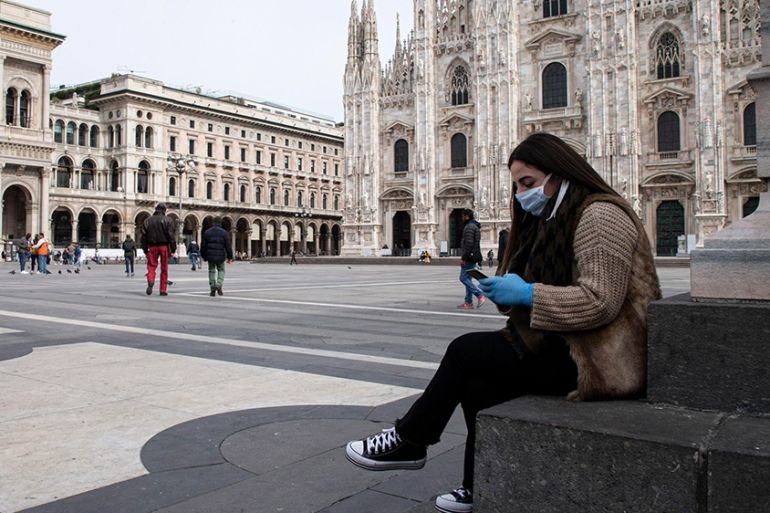Coronavirus panic spreads across Europe: Five developments
With Italy under a national lockdown, fears over health and economy are growing across the continent.

It is the second day of a national lockdown in Italy, the European epicentre of the coronavirus outbreak and the hardest-hit country outside China, and officials are already weighing even tighter measures to combat the infection.
So far, 10,149 people have been infected in Italy and 631 people have died from the virus. Almost 900 patients are in intensive care.
Keep reading
list of 3 itemsCoronavirus: Which countries have confirmed cases?
What happens if you catch the new coronavirus?
With Italy under total quarantine, concerns are mounting across Europe with countries from the east to the west of the continent stepping up containment measures.
Here are the top five developments:
Italy mulls even tighter measures
Italy mulled imposing even tighter restrictions on daily life and announced billions in financial relief on Wednesday to cushion economic shocks from the coronavirus, its latest efforts to adjust to the fast-evolving health crisis.
Prime Minister Giuseppe Conte said he would consider requests to toughen Italy’s already extraordinary anti-virus lockdown. Lombardy, Italy’s hardest-hit region, is pushing for a shutdown of nonessential businesses and public transportation cutbacks.
These additional measures would be on top of travel and social restrictions. Police enforced rules that customers stay one metre (three feet) apart and ensured that businesses closed by 6pm.
Germany says 70 percent of population could be infected
German Chancellor Angela Merkel, citing experts, estimated that up to 70 percent of the population could be infected by the new coronavirus.
Germany had confirmed some 1,300 infections as of Wednesday, with two deaths. The government has recommended the cancellation of all events with more than 1,000 people.
“You have to understand that if the virus is there, and the population has no immunity yet to this virus, there are no vaccines and no therapy so far, a high percentage – experts say 60 to 70 percent – of the population will be infected,” Merkel told reporters in Berlin.
She said the priority was to slow the spread of the disease “so all the measures we are taking are of the greatest significance because they are giving us time – it does matter what we do, it is not in vain”.
But Merkel’s comments may cause panic, Czech Prime Minister Andrej Babis said.
“I don’t want to comment on the situation in Germany, although I believe that such statements rather cause panic. In any case, we have adopted strong measures for such worst-case scenarios to be out of the question,” news agency CTK quoted Babis as saying.
United Kingdom steps up measures to contain financial fallout
As fears across Europe grow about the potential financial fallout from the outbreak, Britain unveiled a £30bn ($39 billion) economic stimulus plan on Wednesday to tackle the risk of a coronavirus recession, just hours after the Bank of England slashed interest rates in a double-barrelled response to the crisis.
Prime Minister Boris Johnson’s finance minister, Rishi Sunak, announced the plan as part of a debt-fuelled investment surge for the coming years that budget forecasters said was the biggest stimulus since 1992 after a decade of austerity.
Meanwhile, British junior health minister Nadine Dorries went into self-isolation after testing positive for the virus.
Cases, deaths surge in Spain
Spain’s coronavirus cases have surpassed 2,000, with roughly half of them in the Madrid region, where two-thirds of the country’s virus deaths have occurred.
The Health Ministry on Wednesday reported 2,002 cases nationally, up by 363 from the previous day. Deaths reached 47, up by 11 from Tuesday.
Fernando Simon, director of Spain’s health emergency centre, said Madrid’s fatalities were high because much of the contagion there was taking place in nursing homes.
Madrid and two regions in northern Spain are closing schools and universities for two weeks to try to slow the spread of the coronavirus. Long queues have formed at Madrid area supermarkets amid signs of panic buying.
Hungary declares state of emergency
Hungary has declared a nationwide state of emergency due to the spread of the coronavirus and banned the entry of people arriving from Italy, China, South Korea and Iran.
University classes have been suspended since many foreign students attend them. Classes at schools will continue for now, as young children seem to be among those least affected by the virus. Events cannot be held for more than 100 people indoors and over 500 people outdoors.
So far, Hungary has 13 cases of the coronavirus, several of them Iranian students who have recently returned from their homeland.
Several US states and Italy are among other places to declare a state of emergency because of the virus.